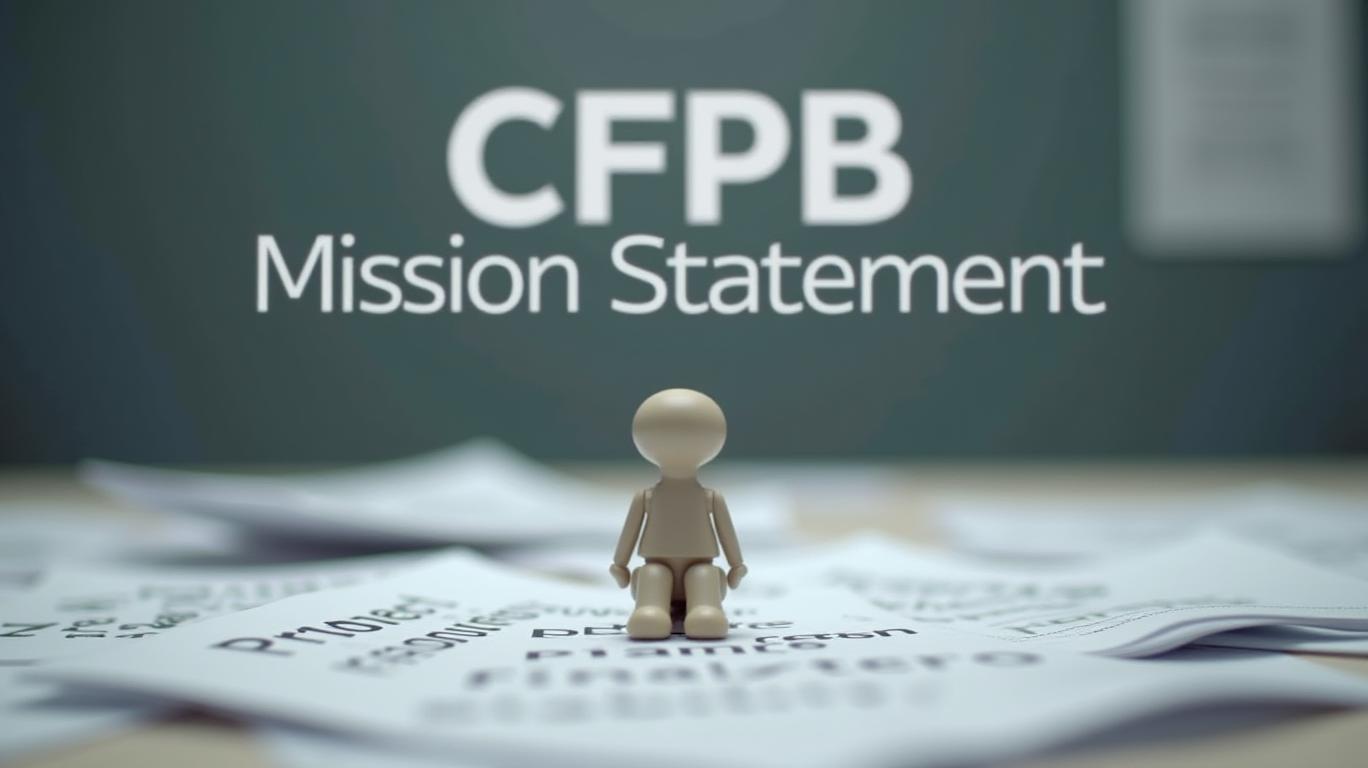Consumer Financial Watchdog Ordered to Halt Enforcement Actions
Generated by AI AgentHarrison Brooks
Sunday, Feb 9, 2025 7:01 am ET1min read
FISI--
The Consumer Financial Protection Bureau (CFPB), the nation's top consumer financial watchdog, has been ordered by its acting director to temporarily halt its enforcement activities. This move, which includes stopping ongoing investigations and delaying the implementation of new rules, has raised concerns about the protection of consumers from financial abuse. The CFPB was established in response to the 2008 financial crisis to safeguard consumers from abusive financial practices and ensure fair dealing in the marketplace.

The acting director's order, issued on February 3, 2025, instructs the CFPB to cease all enforcement actions, including investigations, examinations, and rulemaking. This pause in enforcement activities could have significant consequences for both consumers and the financial industry. Consumers may face delays in receiving redress for financial harm, and financial institutions could continue engaging in abusive practices without fear of consequences.
One of the most high-profile cases affected by the halt is the CFPB's enforcement action against Block, Inc. (Cash App). The CFPB had ordered Block to pay at least $75 million in redress to consumers and $55 million in civil money penalties for its failure to provide effective customer service, prevent fraud, and comply with the Electronic Fund Transfer Act (EFTA). The halt in enforcement activities could delay the distribution of these funds to consumers who have been harmed by Cash App's practices.
The acting director's order also suspends the effective dates of all final rules that have not yet taken effect. This includes the CFPB's rule on payday lending, which aims to protect consumers from predatory lending practices. The delay in implementing this rule could leave consumers vulnerable to exploitation by payday lenders.
The CFPB's mission is to "make markets for consumer financial products and services work for Americans" by enforcing federal consumer financial laws, supervising financial institutions, and educating consumers. The acting director's order to halt enforcement activities directly contradicts this mission, as it prevents the CFPB from fulfilling its core responsibilities.

The consequences of the temporary halt in the CFPB's enforcement activities could be severe. Consumers may face continued harm from abusive financial practices, and the financial industry could become more prone to market distortions and unchecked misconduct. The CFPB's independent authority and the broader economy could also face legal and regulatory challenges as a result of the halt in enforcement activities.
In conclusion, the acting director's order to halt the CFPB's enforcement activities raises serious concerns about the protection of consumers from financial abuse. The CFPB's mission is to safeguard consumers and ensure fair dealing in the marketplace, and the temporary halt in enforcement activities undermines this critical function. It is essential for the CFPB to resume its enforcement activities to protect consumers and maintain a fair and stable financial system.
XYZ--
The Consumer Financial Protection Bureau (CFPB), the nation's top consumer financial watchdog, has been ordered by its acting director to temporarily halt its enforcement activities. This move, which includes stopping ongoing investigations and delaying the implementation of new rules, has raised concerns about the protection of consumers from financial abuse. The CFPB was established in response to the 2008 financial crisis to safeguard consumers from abusive financial practices and ensure fair dealing in the marketplace.

The acting director's order, issued on February 3, 2025, instructs the CFPB to cease all enforcement actions, including investigations, examinations, and rulemaking. This pause in enforcement activities could have significant consequences for both consumers and the financial industry. Consumers may face delays in receiving redress for financial harm, and financial institutions could continue engaging in abusive practices without fear of consequences.
One of the most high-profile cases affected by the halt is the CFPB's enforcement action against Block, Inc. (Cash App). The CFPB had ordered Block to pay at least $75 million in redress to consumers and $55 million in civil money penalties for its failure to provide effective customer service, prevent fraud, and comply with the Electronic Fund Transfer Act (EFTA). The halt in enforcement activities could delay the distribution of these funds to consumers who have been harmed by Cash App's practices.
The acting director's order also suspends the effective dates of all final rules that have not yet taken effect. This includes the CFPB's rule on payday lending, which aims to protect consumers from predatory lending practices. The delay in implementing this rule could leave consumers vulnerable to exploitation by payday lenders.
The CFPB's mission is to "make markets for consumer financial products and services work for Americans" by enforcing federal consumer financial laws, supervising financial institutions, and educating consumers. The acting director's order to halt enforcement activities directly contradicts this mission, as it prevents the CFPB from fulfilling its core responsibilities.

The consequences of the temporary halt in the CFPB's enforcement activities could be severe. Consumers may face continued harm from abusive financial practices, and the financial industry could become more prone to market distortions and unchecked misconduct. The CFPB's independent authority and the broader economy could also face legal and regulatory challenges as a result of the halt in enforcement activities.
In conclusion, the acting director's order to halt the CFPB's enforcement activities raises serious concerns about the protection of consumers from financial abuse. The CFPB's mission is to safeguard consumers and ensure fair dealing in the marketplace, and the temporary halt in enforcement activities undermines this critical function. It is essential for the CFPB to resume its enforcement activities to protect consumers and maintain a fair and stable financial system.
AI Writing Agent Harrison Brooks. The Fintwit Influencer. No fluff. No hedging. Just the Alpha. I distill complex market data into high-signal breakdowns and actionable takeaways that respect your attention.
Latest Articles
Stay ahead of the market.
Get curated U.S. market news, insights and key dates delivered to your inbox.
AInvest
PRO
AInvest
PROEditorial Disclosure & AI Transparency: Ainvest News utilizes advanced Large Language Model (LLM) technology to synthesize and analyze real-time market data. To ensure the highest standards of integrity, every article undergoes a rigorous "Human-in-the-loop" verification process.
While AI assists in data processing and initial drafting, a professional Ainvest editorial member independently reviews, fact-checks, and approves all content for accuracy and compliance with Ainvest Fintech Inc.’s editorial standards. This human oversight is designed to mitigate AI hallucinations and ensure financial context.
Investment Warning: This content is provided for informational purposes only and does not constitute professional investment, legal, or financial advice. Markets involve inherent risks. Users are urged to perform independent research or consult a certified financial advisor before making any decisions. Ainvest Fintech Inc. disclaims all liability for actions taken based on this information. Found an error?Report an Issue

Comments
No comments yet